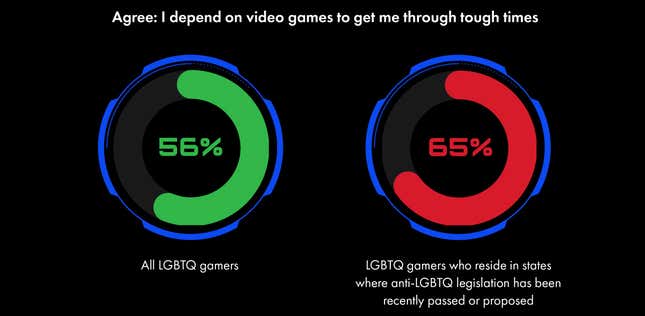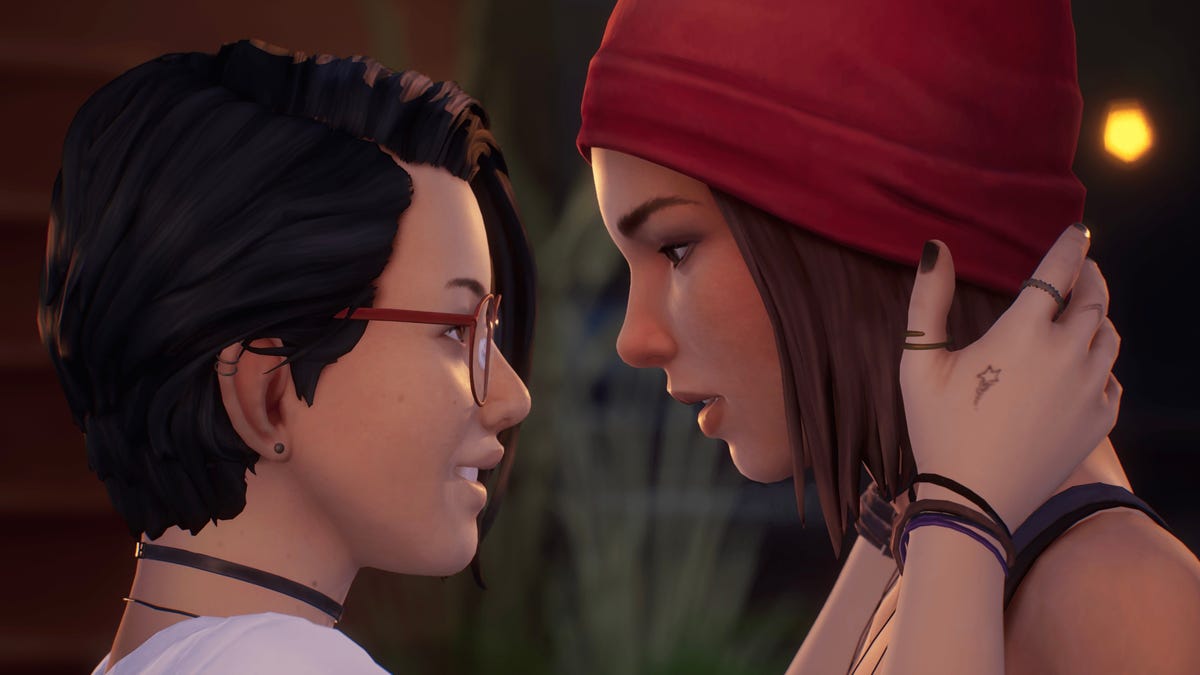I’ve known that representation in games mattered ever since that day in 1987 when I finished Metroid and discovered that intergalactic bounty hunter Samus Aran was that rarest of things (for the time): a cool female video-game protagonist. I loved playing as Mario, or Link, or any intrepid hero, but I was particularly thrilled to see a game say that women can be heroes, too. Now, with games a more important cultural force than ever, the influential media advocacy organization GLAAD has released its first-ever in-depth report examining how games are doing in terms of LGBTQ representation. The data strongly suggests that, on one hand, games play an important role in the lives of many queer players, particularly queer youth, and on the other, that games are falling far short in terms of adequately representing and reaching those players.
The report, released today, is packed with interesting and important statistics, collected in partnership with the media data and analytics firm Nielsen, and you can see it in its entirety here. Among GLAAD’s most striking findings is that 17 percent of active gamers identify as LGBTQ. And yet, only a paltry 2 percent of games on major PC and console storefronts (PSN, Steam, the Nintendo eShop and so on) are tagged as having LGBTQ content, suggesting that games which actually feature queer characters or storylines remain extremely rare. With big, influential games like The Last of Us Part II and Apex Legends prominently featuring queer and trans characters, it’s perhaps easy to feel like LGBTQ representation in games is more widespread than it actually is, when the reality may be that the industry is still falling well short of adequately reflecting the LGBTQ player base.
Games are a refuge for many queer players
The data shows that many people who play games are queer, and that games often play a particularly important role in their lives. For many of them, in this period when hundreds of pieces of anti-LGBTQ legislation are being introduced, games may be something of a safe haven. According to GLAAD, 55 percent of LGBTQ gamers who reside in states where such legislation has been proposed or passed say they feel more accepted in the gaming community than they do in general public areas where they live. Sixty-five percent of players in these states say that they depend on games to get them through tough times, and a whopping 75 percent say that games allow them to express themselves in ways they don’t feel comfortable doing in the real world.

As a trans person who grew up with games and who has known many other queer and trans people for whom games have been a vital avenue of exploration and expression in a hostile world, I wasn’t exactly surprised by this data, and yet seeing numbers asserting just how widespread such experiences are is powerful and compelling. On a video call, I asked Blair Durkee, associate director of gaming for GLAAD, about the perception that games are doing better on the LGBTQ representation front than they actually are. “I think so much of our media is dominated by people who live in more progressive areas,” she said, “and they forget that there’s a wide swath of the country that is still deep, deep in this anti-LGBTQ culture. That was one of the things we tried to highlight with our stats looking at LGBTQ gamers who live in more restrictive states, states that have passed or proposed anti-LGBTQ legislation versus LGBTQ gamers in other areas.”
Even as many LGBTQ players find opportunities for community and self-expression in games, they also remain at higher risk for harassment in gaming spaces, with 52 percent saying they’ve experienced harassment when playing online, and 61 percent expressing discomfort about using voice chat in online games.
The capitalist argument for better LGBTQ representation in games
Of course, GLAAD isn’t just collecting this data because it’s interesting. The organization hopes to encourage developers and studios to do more to reflect and represent LGBTQ players. A common argument I’ve heard for why games haven’t made more effort to incorporate gay and trans characters and storylines is that developers or publishers may be afraid of alienating or driving away non-LGBTQ players. However, the data suggests, that game developers are leaving money on the table, as LGBTQ players gravitate toward games in which they can see themselves reflected. Meanwhile, 60 percent of non-LGBTQ players say that playing as an LGBTQ character would make no difference in their decision to buy a game. “The resistance toward LGBTQ content in games is waning,” says the report’s introduction, “as each successive generation of gamers is more diverse and more open to seeing LGBTQ representation in their games.”
When I asked Durkee what she hopes the report might help to accomplish, she said that it’s about “changing the way the industry really thinks about our community.” She references comments made by Dragon Age lead writer David Gaider, who said that there’s a percentage of the gaming population–like queer and trans players–which is already playing despite being essentially uninvited, and the industry sees us as “gravy”—a nice extra but not a group worth catering to directly. “All this work that we’ve been doing over the last several years,” Durkee said, “has been aimed at changing that mentality. Our community is a huge percentage of the overall gaming population, nearly one in five. And if you’re ignoring that community, you’re doing it to your own detriment. There’s much more to gain by being inclusive and by expanding your audience than by catering to the same old demographic over and over.”
You can read GLAAD’s full, inaugural report on the state of LGBTQ inclusion in video games now.
